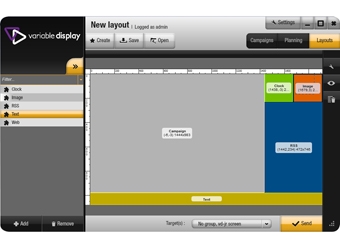With the appeal of its digital signage suite now extending beyond the print houses it was designed for, developer Caldera has announced a powerful new version upgrade. Variable Display 3.0 represents a major functionality boost for adopters, adding remote hardware monitoring, screen layout features and a Flash customization service to help deliver hard-hitting campaigns.
Many wide format printers are already combining digital screens with printed point-of-sale materials and wall coverings to make convincing, integrated graphics content spanning print and digital. Users can now specify and place widgets on the screen, each containing live or static content to be run simultaneously within zones in the visual area. With Caldera’s much-liked drag-and-drop interface, v3.0 owners can create sophisticated templates for quick-service restaurants, retail and a variety of internal communications applications with a few clicks.
Development feedback from previous versions indicated that uptime was a key concern in digital signage installations. Caldera has converted this worry into a major positive in v3.0, adding a remote monitoring tool that observes behavior across all networked players. Vital hardware statistics—including usage and temperature for the CPU, hard drive and motherboard—are collated within a simple interface that allows users to identify, pre-empt and resolve problems before they occur. This ability to provide superior client support and remote system administration is expected to be popular across the Variable Display user base.
An online, form-based template will also make it easier for novice operators to include the visual dynamism of Flash content within their installations, adding to existing HTML5 capability. An algorithm allows simple animations to be created using templates and saved within Variable Display as an asset, removing the complications of using cumbersome external Flash creators. Animated creative is broadly acknowledged to be more eye-catching than static for captive audiences, and Variable Display owners can now take advantage of this to improve dwell time and reactivity.
“Variable Display is now crucial to many installations, from exhibitions and retail to corporate communications,” comments Sebastien Hanssens, vice-president marketing and communication, from Caldera. “Our development team continues to address the most important market shifts with each upgrade. While Variable Display was originally conceived as a way to help wide-format printers fight their way into new revenue streams, its sophistication is now making it one of the punchiest out-of-the-box options in the wider digital signage market.”
Commercially available as of today, Variable Display 3.0 can be downloaded from the Caldera extranet, purchased through Caldera partners or updated via the software’s upgrade panel.











